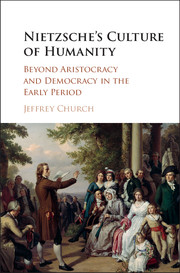Book contents
- Frontmatter
- Dedication
- Contents
- Preface
- List of abbreviations
- Introduction
- PART I The Foundation of Culture in the Early Nietzsche
- 1 The Influence of Kant and Herder
- 2 Nihilism and the Contradiction of Human Nature
- 3 Freedom and the Best Life
- Part II Two Concepts of Culture in the Early Nietzsche
- PART III The Means to Culture in the Early Nietzsche
- PART IV The Significance of the Early Period
- Bibliography
- Index
3 - Freedom and the Best Life
from PART I - The Foundation of Culture in the Early Nietzsche
Published online by Cambridge University Press: 05 October 2015
- Frontmatter
- Dedication
- Contents
- Preface
- List of abbreviations
- Introduction
- PART I The Foundation of Culture in the Early Nietzsche
- 1 The Influence of Kant and Herder
- 2 Nihilism and the Contradiction of Human Nature
- 3 Freedom and the Best Life
- Part II Two Concepts of Culture in the Early Nietzsche
- PART III The Means to Culture in the Early Nietzsche
- PART IV The Significance of the Early Period
- Bibliography
- Index
Summary
How do we overcome nihilism, the inner contradiction of human nature? Some commentators have argued that the early Nietzsche rejects science and advocates a return to myth and religious “communitarianism” (Young 2006). Returning to myth and community would indeed satisfy our human need for wholeness. However, as we have seen, human beings also have a need for perfection, which cannot simply be silenced. Nor should we silence this need, as human beings are distinctive in virtue of our need for perfection. Nietzsche hence is no simple defender of closing our “horizons.” Nor is Nietzsche antiscientific as the “mythic” interpretation suggests. Rather, Nietzsche argues that “it is not a matter of destroying science, but rather of controlling [Beherrschung] it” (UUM 9). His objection to science is rather that it has been mistaken for what it is not. It has been erroneously taken to be an end in itself rather a means for achieving the good life. For Nietzsche, modern science is good in that it heralds the development of universal subjectivity, the standard against which any account of the good life is to be measured. In other words, even in his early period work, Nietzsche is committed to defending the good life for human beings as such, not asking us to submit to a groundless account of the good life according to a particular community.
My argument in this chapter is that for Nietzsche freedom as self-determination is the human good as it heals the contradiction of human nature and redeems human existence. In the first part of the chapter, I argue Nietzsche defends freedom as the good in much the same fashion as Kant and Herder did several generations before. However, in the second part of the chapter, I hold that Nietzsche recognizes the tension between Kantian and Herderian alternatives and reconciles them in the personality of the exemplary individual. Only in the embodied life of this exemplary individual, Nietzsche maintains, can we live for the truth while also displaying an aesthetic wholeness.
FREEDOM AS THE GOOD LIFE
Few readers of Nietzsche think that he holds freedom to be a capacity or a value. Perhaps the clearest statement of this view comes from Leiter (2002), who argues that Nietzsche was a skeptic of the philosophical notion of freedom (87f).
- Type
- Chapter
- Information
- Nietzsche's Culture of HumanityBeyond Aristocracy and Democracy in the Early Period, pp. 55 - 80Publisher: Cambridge University PressPrint publication year: 2015



